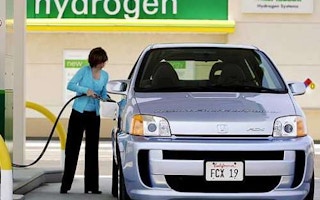Toyota Motor Corp., which is preparing to sell Camry-sized sedans powered by fuel cells next year in the U.S., said it will help create a hydrogen-station network to aid the plug-free electric vehicles’ success.
The concept version of Toyota’s fuel-cell sedan due in 2015 was displayed today in Las Vegas at the International Consumer Electronics Show, along with a prototype that’s been subjected to road and hot and cold weather testing. California, the main initial market, will have as many as 20 hydrogen fuel stations next year when sales of the unnamed vehicle begin, Toyota said.
Using hydrogen to power vehicles “has been seen by many smart people as a foolish quest,” and faces “significant challenges,” Bob Carter, Toyota’s U.S. senior vice president, said today in a statement before the car was shown. “First is building the vehicle at a reasonable price for many people. The second is doing what we can to help kick-start the construction of convenient hydrogen refueling infrastructure.”
Toyota, Hyundai Motor Co. and Honda Motor Co. have announced plans to sell hydrogen cars and crossovers to drivers in California, where state regulators have set strict rules requiring ever greater numbers of “zero-emission” vehicles each year through 2025. Fuel-cell autos are similar to battery-only models such as Nissan Motor Co.’s Leaf hatchback and Tesla Motors Inc.’s Model S sedan in avoiding tailpipe pollution from burning gasoline.
100 Stations
Battery models carry electricity in their lithium-ion battery packs while fuel-cell vehicles make electricity on board in a chemical reaction between hydrogen and oxygen, with only water vapor as a byproduct. While hydrogen vehicles have range comparable to gasoline vehicles and need only a few minutes to refuel — compared with hours for most battery autos — there are few hydrogen pumps currently open to the public.
California has committed to spending as much as $200 million in the state to create a network of as many as 100 hydrogen stations by 2024. Toyota is working with the University of California at Irvine and state officials to identify the best locations for future fuel pumps.
The state currently has only about 10 hydrogen stations, said John Hanson, a company spokesman.
Dealer pumps
Some of the carmaker’s California dealers may install hydrogen pumps, Carter said.
“We’re looking at everything right now,” Carter told reporters today, without elaborating. “We know we have to push the infrastructure.”
Concrete steps by Toyota to set up stations will come within a few months, he said.
The concept car shown today in Las Vegas, the FCV sedan, produces enough energy to power a home for a week, Carter said. Toyota engineers are developing a device that connects to the car that would allow it to act as a backup generator, he said.
The company hasn’t yet announced a precise sale date and price for its fuel-cell sedan. The world’s largest automaker has previously said it might be priced around $50,000 and has range of at least 300 miles (483 kilometers) per fueling.
“Fuel-cell electric vehicles will be in our future sooner than many people believe, and in much greater numbers than anyone expected,” Carter said.
Toyota’s U.S. sales unit is based in Torrance, California. The company’s American depositary receipts fell 0.3 percent to $120.17 at the close in New York.








